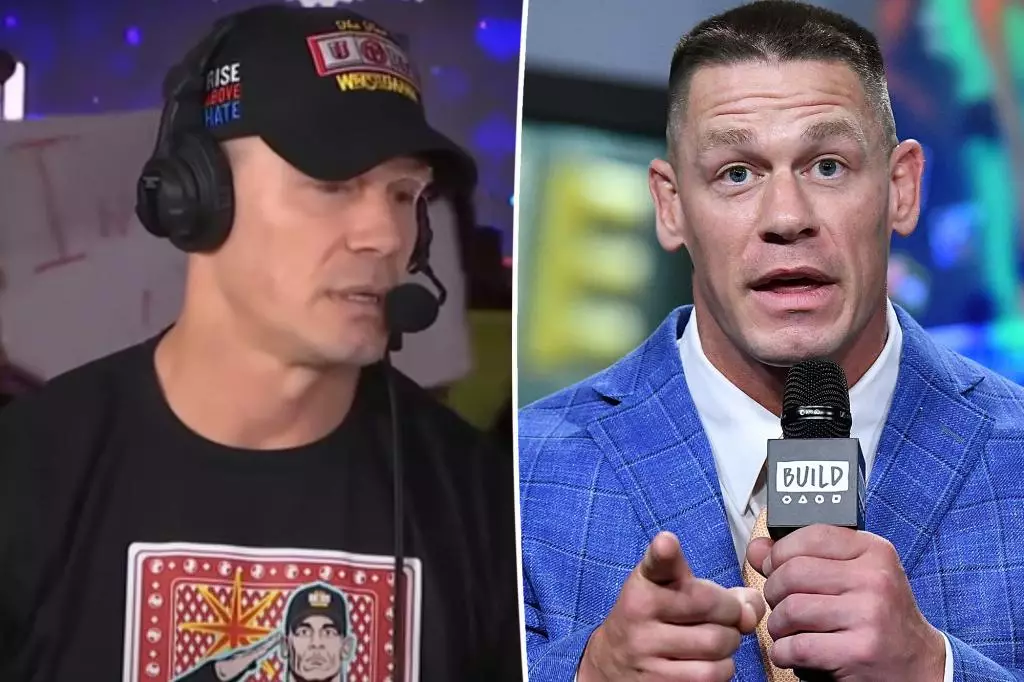John Cena, renowned as much for his wrestling prowess as for his acting career, recently opened up in an unexpected revelation that struck a chord with many. In a candid moment during “The Pat McAfee Show” at the WWE World fan experience in Las Vegas, Cena discussed a personal battle: the impact of fan scrutiny on his self-image, specifically focusing on his bald spot. This admission serves as a stark reminder of the unrealistic expectations placed on public figures, and the deep emotional ramifications that can follow.
As he articulated his experience with what he described as bullying from the audience, Cena’s vulnerability shifted the conversation from trivial aesthetics to a serious topic of mental health. “Y’all don’t know what that’s like,” he asserted, emphasizing the harsh reality of being under constant public scrutiny. In a world obsessed with perfect appearances, Cena’s acknowledgment of his insecurities is not only brave but also an opportunity for introspection in our communal attitudes toward celebrity and body image.
The Price of Fame
The power dynamics at play in celebrity culture often lead to an unrealistic portrayal of perfection. Cena’s journey underscores the harsh truth that fame can come with a high price: personal privacy and self-esteem. With fans chanting and displaying signs that mock his genetic predisposition to hair loss, Cena shed light on how such remarks can amplify feelings of inadequacy, urging the audience to reconsider their actions. “You guys aren’t cool to me,” he quipped, encapsulating the frustrations of many who face similar battles without the spotlight.
In his admission about undergoing a hair transplant, one can’t help but see parallels in other celebrities who convince themselves that their worth is tied to physical attributes. Cena’s choice to address his bald spot through surgical means signals a complex interplay of societal pressures and a quest for self-acceptance. His decision to undergo surgery, while perhaps controversial to some, is rooted in the desire to feel confident in his skin, a sentiment that resonates widely with individuals beyond the realms of fame and fortune.
Cultural Commentary on Masculinity
Moreover, Cena’s candid remarks offer a critical perspective on masculinity in contemporary society. Traditionally, men are often expected to project confidence and invulnerability, yet Cena breaks that mold by discussing his insecurities openly. In depicting his experience, Cena not only challenges the stigma surrounding male vulnerability but also advocates for a more compassionate approach to discussions about one’s physical appearance. He humorously remarked on the process following the surgery: “It takes a while for it to come in,” allowing fans to empathize with his journey instead of mocking it.
His recollection highlights the uniqueness of personal stories amidst a sea of reactions, suggesting that the authentic experience of navigating health concerns can humanize those who seem larger than life. Cena’s relational dialogue with his fans about personal insecurities reflects a shift towards a more authentic discourse surrounding beauty standards and mental health, especially for men, who might struggle to express their feelings.
In an era defined by an Instagram-perfect existence, Cena’s honesty about his bald spot serves as a refreshing breath of fresh air. It’s a call to celebrate individuality and authenticity over societal expectations, encouraging fans and followers to honor their insecurities rather than hide them.

